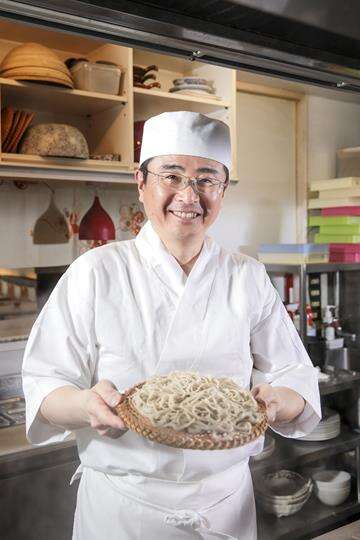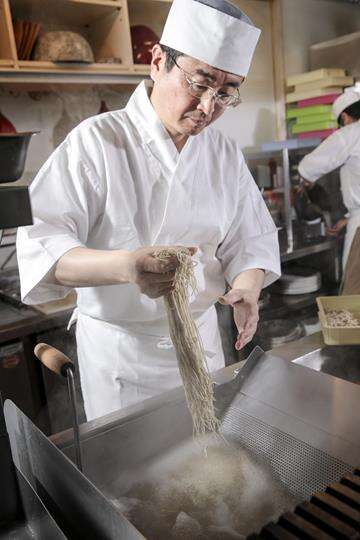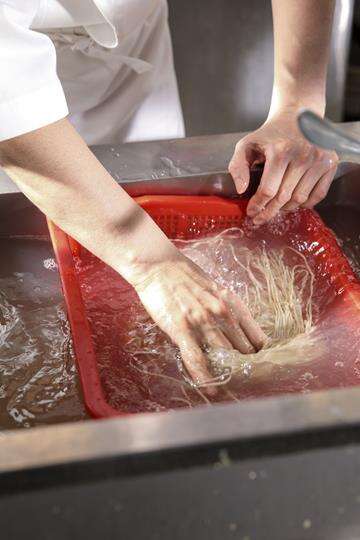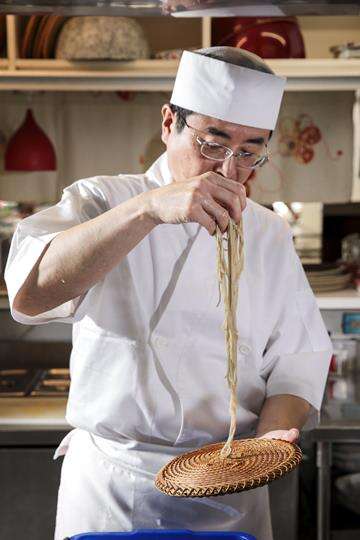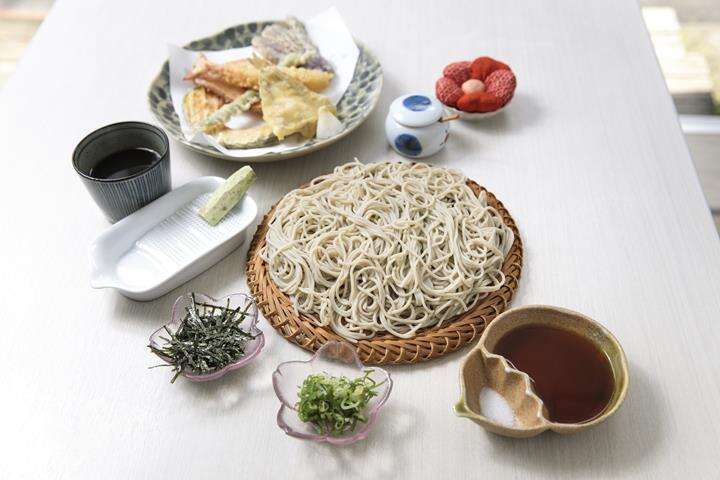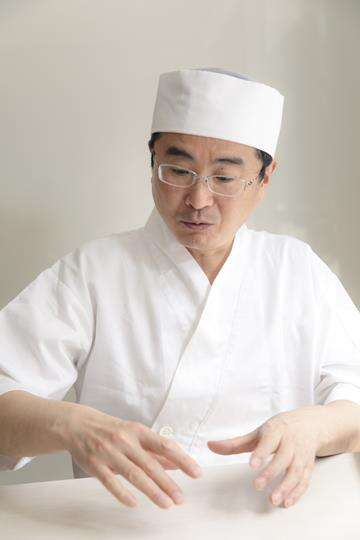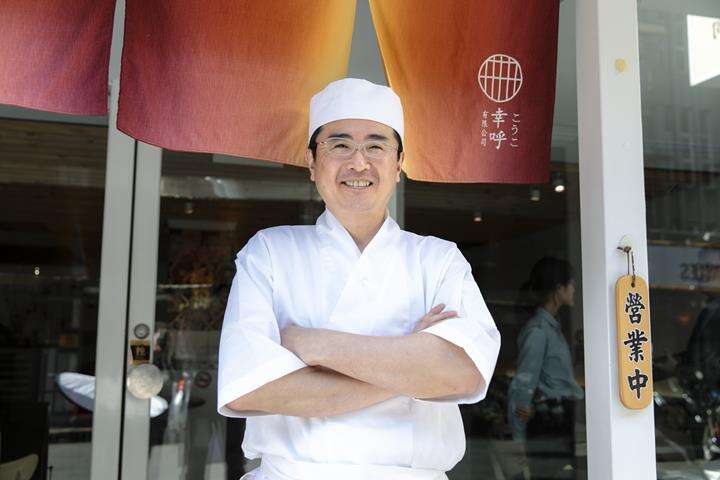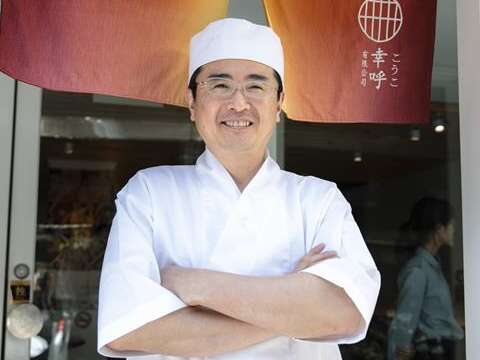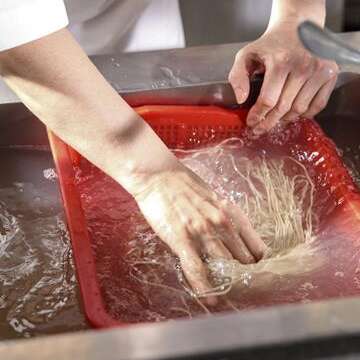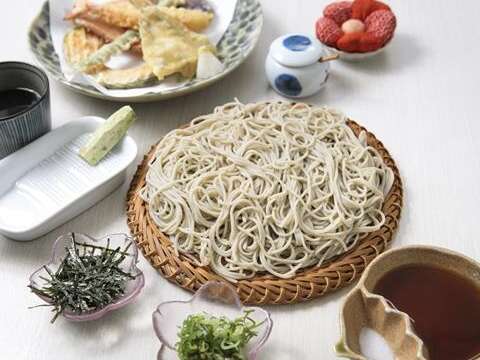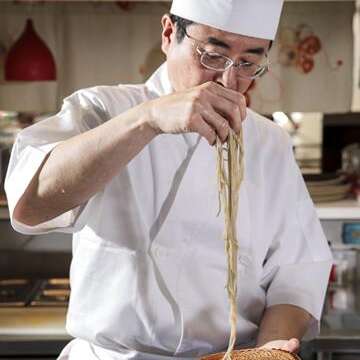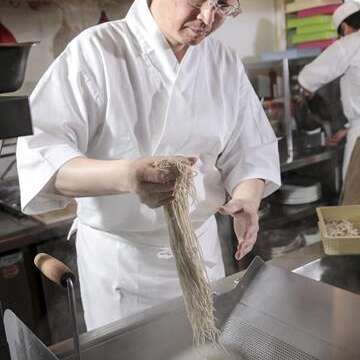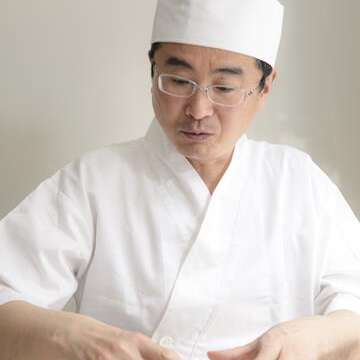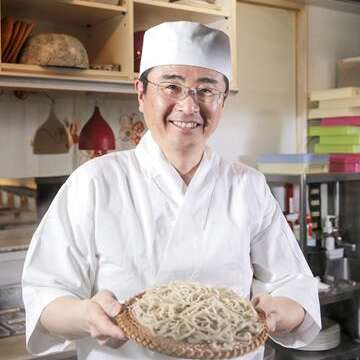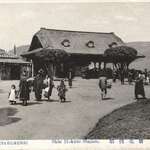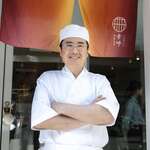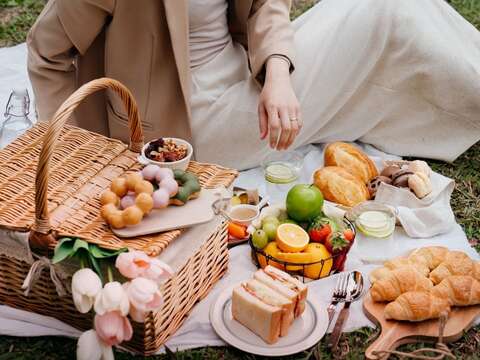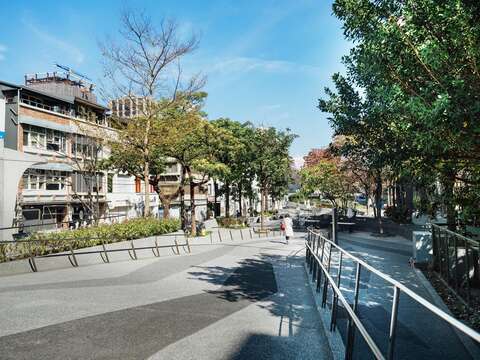Post date:2017-07-19
2233
The Happiness Philosophy of Soba Noodles
Exclusive Interview With Ikawa Masaki, Owner of Xing Hu Soba Noodles
Article|Chiang Hsinying Photos|Shi Chuntai
If ramen noodles can be compared to the beat of a lively pop song, and udon noodles to the warm memories of a late night movie, then soba noodles, which are simple and of deep meaning, can be likened to a poem. Chinese poet Bai Juyi (白居易), who lived during the Tang dynasty (唐朝), has a scene in his work Village Night (村夜): “From a field of fall grass that has experienced snow and frost comes the subtle chirping of insects.” At that moment, no one is walking along the paths connecting the village fields. The poet stands in front of his door looking over the land. Under the moonlight, a sea of buckwheat appears like snow covering the ground. This simple line from a poem describes many aspects of buckwheat, which is cultivated in fall. This same view can be enjoyed each year from October through December in Changhua County’s Erlin Town (二林鎮). However, if you want to taste the poetic quality of buckwheat noodles, you must visit the Japanese soba noodle master – Ikawa Masaki – in the kitchen of his restaurant, Xing Hu Soba Noodles (幸呼蕎麥麵屋).
▲ (Photo: Shi Chuntai
From Tokyo to Taipei, Rolling Up His Sleeves and Entering the Kitchen
Each Friday afternoon around two o’clock, the lunch crowd along Taipei’s Guangfu South Road (光復南路) begins to thin. Xing Hu Soba Noodles still has four or five tables of customers. In the kitchen, Ikawa is busily boiling then lightly rinsing noodles, before putting them on plates, all in one seamless motion. The Taiwanese often think of the typical Japanese restaurant as somewhat hidden and not well lighted. In contrast, the interior of Xing Hu Soba Noodles is refined and bright. From the street, one sees inside through a large window, which gives the place an atmosphere of approachability. The taste and style of the design are marked by Ikawa’s gentleness and sophistication.
“In Japan, young people like the richness, fattiness and novelty of ramen noodles. Around age 30, people start to feel a physical change and start to prefer udon noodles, which are not as strong in flavor. After 40, they like the healthiness of soba noodles. These are light and don’t create a feeling of heaviness,” says Ikawa. In actuality, 40 was also a dividing line for Ikawa. The changes he made in his life were much larger than those he made in his taste preferences.
Ten years ago, he came to Taipei as a tourist, and the city made a great impression on him. He says, “Taipei is very convenient. There are many Japanese restaurants on the main streets, and most people can speak a little Japanese.” He also noticed that most of the Japanese eateries sold sushi, ramen or udon noodles. There were few selling soba, one of the three main noodle types in Japan. It was mainly convenience stores that stocked cold noodles. He says, “People don’t know what is good about soba noodles. Taiwan and Japan are very similar in various aspects, so I feel everyone should be able to accept soba noodles.” It was this idea that made him leave his job of many years in a food company to travel across the ocean, roll up his sleeves and start a new career with a selection of small, black buckwheat grains.
▲ Unlike dry convenience store soba noodles, fresh noodles are boiled for only about a minute. As 100% buckwheat noodles have low elasticity, they must be cooked for just the right amount of time. If not, they easily lose their elasticity and aroma. (Photo: Shi Chuntai)
▲ The cooked noodles are immediately placed in ice water. Then they are stirred quickly and gently to remove any sticky residue and to preserve a delicate texture. (Photo: Shi Chuntai)
▲ After cooking and cooling, the soba noodles are placed on a bamboo tray. This is the most common and classic way of serving them, and it allows the flavor to be fully savored. (Photo: Shi Chuntai)
Freshly Made Soba Noodles Combine Japanese and Taiwanese Flavors
Ikawa says, “When I was working in a food company, as soon as an order came in, the factory would quickly produce the requested noodles. But, I like the feeling of making soba noodles by hand very much.” Every morning and afternoon, he patiently makes noodles for the lunch and dinner crowds. Buckwheat flour is produced from grains shipped in cold storage from Changhua County’s Erlin Town. These grains are milled to preserve the distinctive aroma of freshly-made 100 percent buckwheat soba noodles. With his experience in food purchasing, Ikawa prefers shopping for local, seasonal ingredients. While the sweetness of Japanese buckwheat hides a touch of bitterness, Taiwan’s warm climate stimulates a fruity fragrance and a sweetness in the buckwheat grown in Erlin. Soba noodles go well with cherry duck (櫻桃鴨) from Yilan (宜蘭), mango from Aiwen (愛文) or domestically produced pork. Flakes of dried skipjack tuna (柴魚), soy sauce and Alishan (阿里山) grown wasabi are added, creating a blend of cold, hot, salty, sweet, sour and spicy tastes. Strict Japanese methods are used in preparation to ensure the unique flavors of Taiwan.
▲ The specialty at Xing Hu Soba Noodles is tempura with 100% buckwheat soba noodles. The fragrance and texture are wonderful. Thin noodles are wrapped around pieces of fish, shrimp and different vegetables, and then deep fried until crispy. This is complemented with Alishan wasabi, which leaves a piquant aftertaste. (Photo: Shi Chuntai)
Buckwheat flour noodles are not as tough as those made from durum. 100% buckwheat flour dough is soft and crumbles easily. Thus, the quality of the soba noodles depends entirely on the touch and experience of the chef if delicious, intact results are to be achieved. Freshly cooked soba noodles are chewy and smooth. They are best eaten quickly to avoid them becoming soft and breaking apart. However, many Taiwanese diners do not really understand how to eat soba. They are accustomed to chatting during meals and some people even pour sauce over the noodles on the bamboo tray. These cultural differences caused a lot of anxiety for Ikawa at first. Fortunately, his wife patiently explained things to each customer. Over time, the diners that have passed through have become more familiar with soba. Thus, little by little, the memories of difficulty have faded only to be replaced by the sweet feeling of achievement.
▲ Ikawa Masaki has lived in Taipei for five years, and although not fluent in Chinese, he is still able to communicate. Before the interview, he prepared paper, pen and tablet computer so that when not able to express himself in words, he could just draw a picture or use body language. He is clearly enthusiastic toward people and soba noodles. (Photo: Shi Chuntai)
In her five years in Taiwan Ikawa’s wife, who likes handmade arts and crafts, has spent a lot of time in Taipei’s art museums. Ikawa’s two favorite things are mangos and the sunset over Tamsui, so perhaps he imagines Taipei in hues of red. He talks in short phrases, using the essence of poetry. Food is the shortest distance between culture and the land. The cultural meaning of soba noodles in Japan is very similar to that of Taiwan’s noodles. As they are long and easily break in the mouth, they symbolize longevity and avoiding disaster. Usually, they are eaten on the last day of the year. Ikawa and his wife, like all denizens of Taipei, love New Year’s Eve when the restaurant gets very busy with people waiting for the midnight fireworks. The normally quiet Japanese noodle shop takes on a festive atmosphere. Expressions of friendliness and hospitality become condensed, removing barriers of time, space and culture. Whether in Taipei or Tokyo, nothing produces smiles of satisfaction like soba noodles. This is exactly as Ikawa and his wife intended with their restaurant’s name, Xing Hu Soba Noodles, which means “Ask for happy soba noodles.”
幸呼蕎麥麵
Xing Hu Soba Noodles
34, Ln. 260, Guangfu South Road, Daan District
(大安區光復南路260巷34號)
11:30~14:30; 17:30~21:30
Gallery
Popular articles
 TAIPEI QUARTERLY 2017 SUMMER Vol.08
TAIPEI QUARTERLY 2017 SUMMER Vol.08 Reviving the Glory of Youth – the 1950s to the 1970s The Golden Age of Audio (TAIPEI QUARTERLY 2017 SUMMER Vol.08)
Reviving the Glory of Youth – the 1950s to the 1970s The Golden Age of Audio (TAIPEI QUARTERLY 2017 SUMMER Vol.08) A Hundred-Year-Old Station Brings Back its Glory: Xinbeitou, an Outpost of History and Tourism (TAIPEI QUARTERLY 2017 SUMMER Vol.08)
A Hundred-Year-Old Station Brings Back its Glory: Xinbeitou, an Outpost of History and Tourism (TAIPEI QUARTERLY 2017 SUMMER Vol.08) Mr. Mario Ste-Marie Executive Director, Canadian Trade Office in Taipei (TAIPEI QUARTERLY 2017 SUMMER Vol.08)
Mr. Mario Ste-Marie Executive Director, Canadian Trade Office in Taipei (TAIPEI QUARTERLY 2017 SUMMER Vol.08) The Happiness Philosophy of Soba Noodles Exclusive Interview With Ikawa Masaki, Owner of Xing Hu Soba Noodles (TAIPEI QUARTERLY 2017 SUMMER Vol.08)
The Happiness Philosophy of Soba Noodles Exclusive Interview With Ikawa Masaki, Owner of Xing Hu Soba Noodles (TAIPEI QUARTERLY 2017 SUMMER Vol.08) 2017 Taipei Children's Arts Festival, Taipei Arts Festival, and Taipei Fringe Festival A Dynamic Mid-Summer of the Arts (TAIPEI QUARTERLY 2017 SUMMER Vol.08)
2017 Taipei Children's Arts Festival, Taipei Arts Festival, and Taipei Fringe Festival A Dynamic Mid-Summer of the Arts (TAIPEI QUARTERLY 2017 SUMMER Vol.08)
 The Happiness Philosophy of Soba Noodles Exclusive Interview With Ikawa Masaki, Owner of Xing Hu Soba Noodles (TAIPEI QUARTERLY 2017 SUMMER Vol.08)
The Happiness Philosophy of Soba Noodles Exclusive Interview With Ikawa Masaki, Owner of Xing Hu Soba Noodles (TAIPEI QUARTERLY 2017 SUMMER Vol.08)